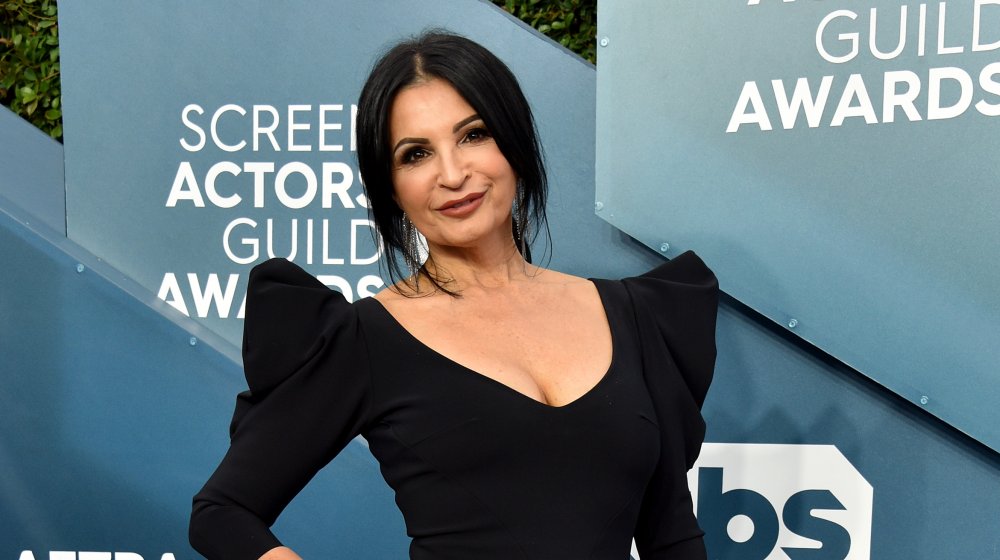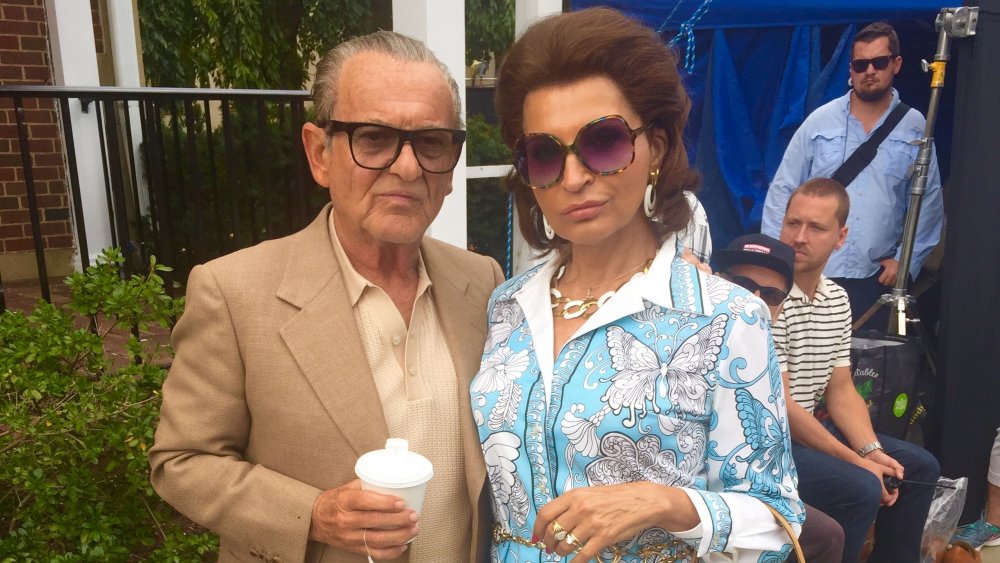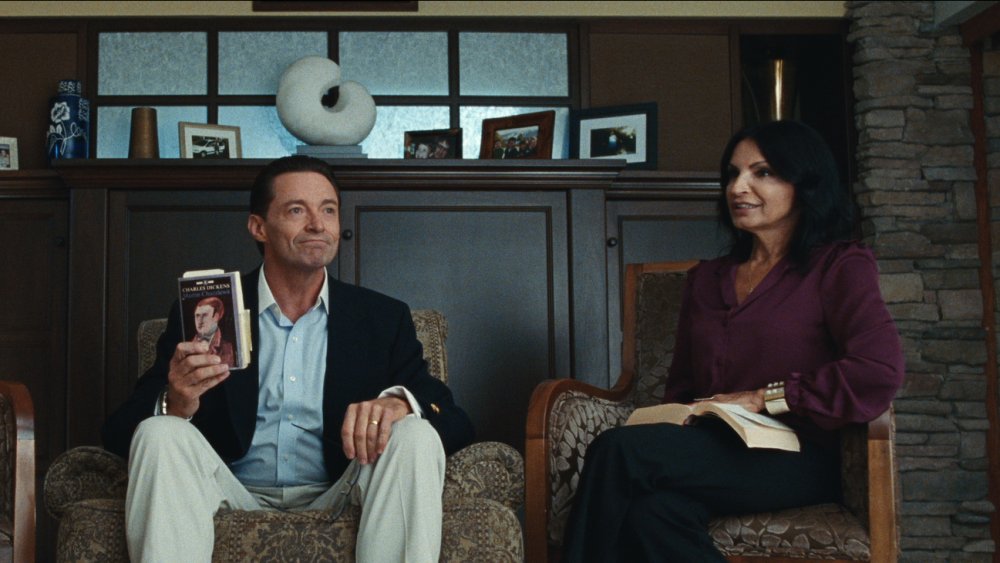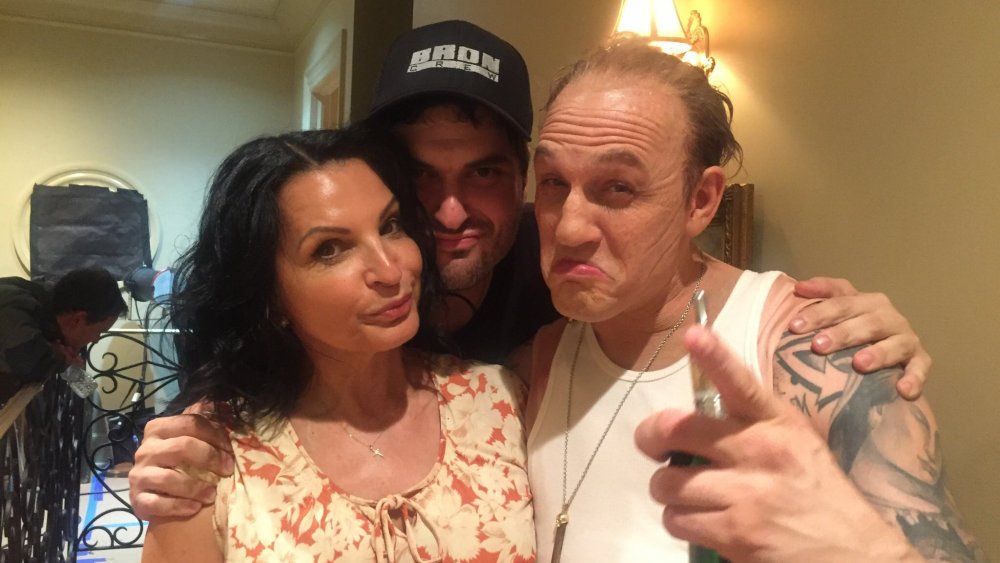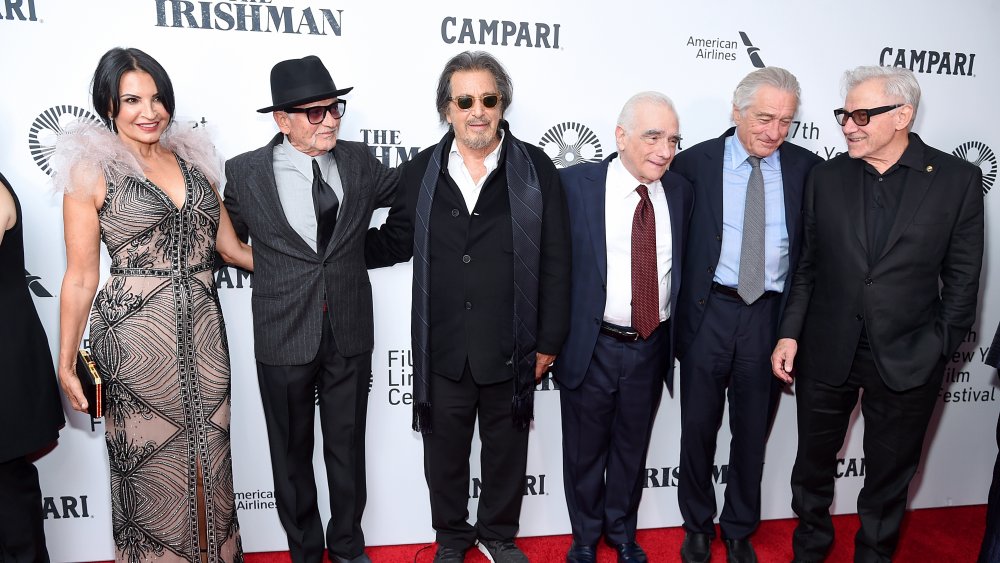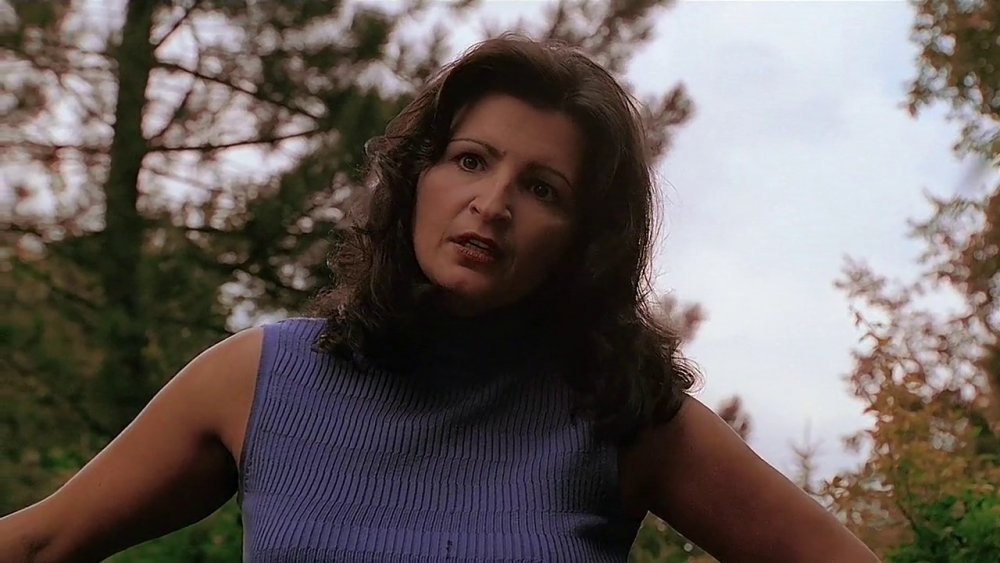The Sopranos' Kathrine Narducci On Capone, Bad Education, The Irishman, And Family-Style Filmmaking - Exclusive Interview
If you're a fan of stories about organized crime and misdemeanors, you've probably come across Kathrine Narducci. The New York City native had her first film role in Robert De Niro's directorial debut, 1993's A Bronx Tale. Since then, she's carved out a bit of a niche in the genre, even landing a long-running stint on The Sopranos as a friend of the title family. That's not, however, all she has going on, as she's made numerous appearances on television shows like Godfather of Harlem, Power, and Third Watch.
Most recently, Narducci has surfaced in a trio of high-profile films: As the wife of Joe Pesci's mob boss in The Irishman, opposite Tom Hardy in Josh Trank's Capone, and sharing the screen with Hugh Jackman in the suburban academic scandal flick Bad Education. Looper caught up with her to discuss working with Scorsese, her time on The Sopranos, and what it's like to share the screen with three very different movie stars in Jackman, Hardy, and Pesci.
Kathrine Narducci's entry into a life of crime (movies)
So, let's start with your origin story.
Well, I was actually... it's a long story, and I always have a hard time trying to make it short, but I was a closet-case actress. I would always go in Backstage, it's an actor's sort of paper for open calls, and mostly non-union. And I would always be doing that. Nobody knew that I was trying to be an actress. So, then what happened was, when A Bronx Tale had an open call, and there was an ad in The Daily News or The Post, I forgot what paper, and somebody at my job where I was working — I was not an actress, I was working in a billing department at the Hunts Point Terminal Market — somebody said, "Oh my God, you should go on this open call. De Niro's looking for nine-year-olds to play his son." I think my son was seven at the time. And so, I took my son on the audition and I realized that there was an open call for the mom, too. That's how I found out about it, and got that role through an open call, taking my son.
And then you're working with Robert De Niro as a director in your first feature film.
Yeah. And then the next thing, I'm on a set with Robert De Niro, directing me playing his wife. Yeah.
So, looking back at your filmography, obviously, I think with that movie, with The Irishman, with Capone now, you end up in a lot of movies that have this crime or gangster element to it. What's your perspective on playing in that type of milieu without descending into caricature?
Well, the only time it's really good is when there's a good... I know authentic, and when it's easier to do on anything as far as any movie is concerned, not just that genre, is when something is, when it's a whole, the collaboration, when everybody is excellent at their job. So, from the writing, it makes it a lot easier when you have a smart writer, who's not just making a caricature, and sort of like this idea of what they think people are. And instead of just writing for a human being who happens to be from that community, or that world, and making them more real and grounded. When you make a real character, it doesn't matter if they're a bigger-than-life character, like a Tony Montana or a Tony Soprano, when it's written well, because both those movies could have been written really bad, and the actors could have taken it to another place if it was any other actors. And the director could have directed it in another place if it was any other director.
But when you have the whole thing, all the ingredients are right, and you have it on a quality scale of like a 10 out of, one to 10, and it's a 10, meaning everybody from the director to the production to wardrobe, everybody's all a collaboration. And that's what makes it much easier, when it's well done, when it's done on a human level, not some kind of an idea or some clowns, some cartoon character — as we see a lot of, I think. Everybody thinks they could just write a mob film if they just get somebody to talk like this, and act like that, and talk about this, and talk about that. But that's not what it's about. These are people who are real people, trying to survive in the real world, make money, whether it's legal or not, but they're real people. That's the point.
They're not cartoon characters. That's the world they come from. That's what they know. That's what they were dealt. That's how they grew up. That's what they grew up around. And that's their life. If they had the opportunities, like any other legit person, in that world they grew up in, they would be just as good. It's your life circumstances. What I'm saying is, the moral of the story is that they're real people. And if you get a script that's written for real people, it's a pleasure to do.
Other than going where the work is, what draws you, personally, to roles in these kinds of movies, artistically speaking?
You know, it's not that I'm even drawn to it. I'm not really drawn to it. That's, ever since I did A Bronx Tale, I was very young. I played a mother, I was so young. I played a mother in that movie, when I was in my 20s, and I got stereotyped. I got put in a box. And now, ever since that movie, that's what people think of me. You know?
So I do it, it's a job. And sometimes, it's written well, like I said, and it's great, and you love being in it, and you're proud of it. And sometimes, they're not so great. But that seems to be what I get cast as. It's not that I'm drawn to it, and I'm saying, "Wow, I really want to do this." I mean the Scorseses and the De Niros, yes, always. And David Chase. But it's not that I'm so drawn to it. I'm drawn to any writing that's good. That's what I'm drawn to, no matter what it is. And that's really it. It's not so much I'm drawn to gangster films, because I'm really not.
Kathrine Narducci on sharing the screen with Hardy, Pesci, and Jackman
In Bad Education in particular, you got to bounce off of Hugh Jackman, and actually, you've recently gotten to work with three actors with big personalities: Jackman, Joe Pesci, and Tom Hardy. What's your perspective on working with them, and what they bring to the table?
Well, all totally different. It's totally different, the way they work, the process, and all that. But Tom Hardy was a pleasure to work with. I thought Tom was going to be more method, which I'm sure he is, but I thought he was going to be living it the whole time. And I had my idea of what I thought he was going to be, because he's so good. I think he's such a great actor. And I thought that he was going to be the character on and off, in between takes, and he was more light. He was funny. He had a great sense of humor. And it was very light. It wasn't that intense as I thought it was going to be. That makes you follow. You're there with them, and you acting is reacting, and then you just follow.
It was a very light and fun scene. Josh Trank, the director, is my dear friend, and I think he's such a good director, and he's such a young, great talent, I think. And I liked the process. It was a very easy, chill set. Everybody was very chill, it wasn't that intense. And some days, when it was really intense scenes, like there were some dark scenes in the movie, you felt that. People were doing their job. The actors were working. But other than that, Tom was very, very fun to work with. I love Tom. I feel so blessed that I am able to say that I was able in my career, no matter what size, the scale of the role, that I got to work with these people, even be in the same movie as these people.
Joe Pesci? A doll. Very serious about the work. Very generous actor, very giving actor, loving. I love working with Joe. Joe, oh my God. He goes up there as one of my favorites. When it's with Bob and Joe, every scene was with the both of them. It's an actor's dream come true. I mean, who gets to do that? Not many people. So I feel very, very, very blessed. I mean, it was great.
And Hugh Jackman is a very generous, as I said, he was very generous actor. And I say generous, I can tell he's probably a generous person in life. The second day, he bought everybody a lotto ticket. He gave lotto tickets out on set. So, just to say what the set was like, very kind, very... And most of the time, just so you know, the bigger the actors, the less ego, I think. And the less trying to prove. I love working with the big guys, because the set's always like there's no ego.
What was it like with Joe Pesci in particular? He was playing very much against what he usually does, which is that big, boisterous personality. As an actor going in, were you surprised by that take?
No, because he, when I spoke with him, he was funny. He goes, "This guy is a very quiet guy. It's not like the usual role that I play." And I was happy for him, because I know that's something he'd want to do, you know? So he said, "So, I'm thinking, I would probably have married a very quiet wife." Yeah. So I was like, "Oh, okay. I get it." And I loved working with him, though. He wrote that scene for me coming down the stairs. He added that. That wasn't in the script. Which I will forever be thankful for.
Kathrine Narducci on working with legendary, and first-time, directors
You mentioned Josh Trank. You have worked with some of the more venerable names out there — Clint Eastwood, Martin Scorsese — as directors. And then recently you had Josh Trank, who had a little bit of a filmography, but he's relatively new. Cory Finley, with Bad Education. This is early for him. What are the differences between those two kinds of experiences, working with these guys who've been around forever, versus these new, up-and-coming talents?
You know, my honest opinion, when somebody is going to have a career and you know that they're talented, like an up-and-comer like a Cory or a Josh Trank, I mean, it would be unfair to say that there's not much of a difference. Of course there's a difference. But they are so good at what they do, that it just feels like you're with somebody who is going to be somebody. As opposed to another young director who's good, but you don't feel that, "Oh, this guy's going to be doing great things." And I think both with Cory and Josh, you could feel, there's a confidence. When you're going to be good, and you are good, and you're going to be one of the new young promising directors, that confidence is already there from day one.
I loved working with them. And Josh Trank, to me, is so f***ing talented. That guy is so talented. And sometimes, you get a good one, you don't always hit it out of the park. I know everybody talks about the Fantastic Four, but that was a little bit of a.... not such a little bit of a flop, there, but everybody has a bad one. He's talented, though. The differences, I mean, I guess the difference would be the way people treat them and the crews. You know, Marty's got his crew. He's working with the same crew. He's a very loyal guy. He's got Thelma Schumacher, who's been with him forever. Everybody respects them on set. Everybody knows who they're working with there. They know what they got while they're working, when they're working with these big guys.
Clint, he's with everybody forever also. He's got the same crew forever. They may be a little more sure and confident and seem like, of course they've been around longer. They really know what they're doing. But I don't know. I guess it just depends on the way people treat them. One is Marty, one is Cory, one is Clint Eastwood, one is Josh Trank. I mean, there's a difference in the, I guess, the respect.
On those sets, Capone and Bad Education, was the buy-in immediate for you in particular, with these directors?
I mean, I think that Josh is so, I just love... I've known him a long time, so I just knew that he could pull it off. And him and Tom hit it off right away, because as soon as you meet Josh, you know that he's, you could just talk to him and the guy is so talented. He's also, he started out an editor. His father was a pretty big editor, who won an Academy Award. He's been around it his whole life.
I think that this movie, to me, was supposed to be exactly what it is. People are going to think right away, as soon as they hear "Capone," they're going to think "bang, bang, shoot 'em up, machine guns, strong Capone." It's not that movie. Just at the end of this guy's life, he goes home to live with his family and die in peace, with his family taking care of him. He had syphilis. He's losing his mind. And he's just in this... he went mad, Capone. You lose your mind when you have syphilis. It basically eats your brain away. I mean, it's like having dementia. You don't know who anybody is. You don't know who you are.
It's a horrible death. But, I mean, I think it's a very quiet, it was supposed to be like a very quiet sort of indie type of movie, and it's a different perspective on Al Capone that we've never seen, and a different take. And I tip my hat to Josh for writing this, and even thinking about this. Because nobody thought about, well, what was Capone like? I think it's such a good story, how Capone ended up dying, because it's based off, I think, mostly truth.
It's striking that you've now worked with two actors playing Al Capone. De Niro wasn't Capone in the movies you did with him, but he did play him in The Untouchables.
Yeah, it was funny. I was in Boston, and I went to a festival in Boston. I've never been to Boston, and everybody was so nice. And this guy comes out in the street, out of his house, and he purposely wore... I realized it later on, but he came out and he had this Pesci/De Niro t-shirt on from Goodfellas, or something like that. And he came over to me, and I looked at the shirt, and I was like, "Oh my God, I can actually say I was married to both of these men onscreen."
Kathrine Narducci on de-aging in The Irishman
What do you think about the de-aging technology that was used in The Irishman? There was a lot of talk about that before the movie came out, and obviously it has huge ramifications for the industry as a whole. How did you feel about it?
I mean, I was really curious about it, as we all were. Everybody was just dying to know, everybody's asking each other, "Did you hear anything? How does it look?" Everybody was curious about it. I mean, that's so interesting. I thought it was cool. I thought it worked. It served a purpose. I think it worked. I thought it was better than Benjamin Button. I think we've come a long way from that. Benjamin Button freaked me out a little bit. I didn't like the way that looked. But I thought this was good.
As an actor, how do you feel about it, though? It's something that is obviously going to become more and more prevalent in the industry.
I'm not really crazy about it. I'm not really crazy about doing that. I wish there was another way that we could make somebody younger and older without that, the technology, because it freaks me out a little bit. I'm not really that crazy about it. How do you feel about that?
Personally, right now, I prefer it when they cast younger actors who just look like the older actors, because I think that one, that's more interesting, and two, the facial stuff is really good, but they haven't quite gotten the movement down as much. And you could kind of — this is my personal opinion on The Irishman — you can kind of tell when De Niro was playing younger De Niro, that he wasn't moving like a 20-, 30-, 40-year-old man, you know?
Oh, I see what you're saying.
As much as they do that, as much as they've worked on it, there are just things that bodies do differently at different ages. That was the one thing that kind of threw me off there. It's amazing. It's only going to only be a matter of time until they figure that part out as well, I'm sure. But I don't know, I always kind of liked the creative casting choices of having to find people to play younger versions of older actors.
Even when they have to go back in time, you'd say, go get a younger actor to be you and be the younger version of that character? Like get a real person?
I mean, yeah. I don't know. I think I kind of agree with you. I kind of agree. I mean, The Irishman, though, they had to do it to construct the story. And you're not going to get somebody to just... You couldn't do that where you would get another person, it's not like they went back to childhood. It's not like, "Oh, let's get the ten-year-old," you know, what was his name? Frank Sheeran... They're not going back that far. So, you're between a rock and a hard place, and that's who Marty's choices were in who they were going to be, De Niro and Pesci. He didn't want anybody else. So I guess they had to do it.
Sure. And believe me, I would never say that I could make a call about anything filmmaking over Martin Scorsese.
[Laughs] Yeah, no.
Making The Sopranos was a family affair for Kathrine Narducci
Last year was the 20th anniversary of The Sopranos, and you all had a reunion for the first time in a long time. Was that the first time you'd been around that cast as a group for a while?
Well, everybody became friends with who they became friends with, stayed in touch with who they're going to stay in touch with. And a lot of us are close, like me and Vinnie, me and Jamie, Robert Iler, Drea. We're all close at heart. I don't think any of us would not be able to pick up a phone and just start shooting the s*** with the other person without, it would just be like we'd pick up where we left off. But that was... because, like I said, we all stayed, I'm in touch with maybe on a, not an everyday basis, but very much in touch with like a handful of them. But all of us are like that. Nobody's in touch with everybody.
So, for us to all be together that day and seeing each other in the waiting room, when we got there, the green room, I mean, we were crying. Everybody was crying. It would have been so different if it was the reunion and Jimmy was still alive. But getting there and everybody knowing what we're thinking of, it was very bizarre. Very bizarre without James. I did a short film with James, when we were doing Sopranos. The first year, we did a short film. It's just me and him. And if you watch The Sopranos, I don't know if you remember the Jewish guy on the floor, he says, "You're standing in front of the Romans. Where are they now?"
Yeah. Yeah. Okay.
That's Ed. Me, Ed, and Jimmy did a short film called A Whole New Day, and we did it while we were filming Sopranos. And James is f***ing so good in that, too. You should watch it. It's on Vimeo. It's really good. When Cinemax had it, it was on Cinemax for a long time. And then, I guess, they stopped playing it. But he's so good in that. James was so good. Oh, God. That day was very hard for us. I think it was bittersweet. That would be the word it would be.
The bitter part being his absence?
Oh, the guy was such a big presence. He was bigger than life, Jimmy. And he was like our leader. He was the guy. He was who everybody looked up to. He was who called the shots. He was the best. And him and Tony Sirico were so close, and Stevie Van Zandt, they became so close. I felt so broken for them. They were the guys, they all hung out. Stevie, Jimmy, Tony Sirico, Vinny Pastore. They all became friends. Michael. They were like the guys' guys, you know? They all became friends. They all loved each other. So that was a big loss. And then when we all got together that day, it was like we lost our brother. Our brother. We were family, and we lost our brother.
What would you call the defining experience for you of working on that show?
I mean, to me, after that show, it was pretty hard to... you can't even explain, unless you were one of us, how you will never experience that again on another set. And it wasn't about the fame, and it wasn't about how popular the show was, because we didn't know. When you're part of the show, you don't realize how popular it is. And I said it on Good Morning America, we didn't realize. When we got to L.A. the first time for the Emmys, we were like, "Whoa." We didn't realize it.
So, being on that set was not like any other set. We were so close. And there were no egos, and there was no... David Chase was just like our friend who was writing for us, and all the directors were like friends. And the crew, the prop people, everybody was treated like family. It was like if you said to your own family, "Let's all go make a movie." And your uncle was the prop guy, and your aunt was doing... It really was that much love and respect for each other, and so different. So different. And it was a New York vibe. It was New York. It was, because I've worked in L.A. a lot, and it's great, I have nothing bad to say about L.A., but the family that we had, the love and the closeness, and it just... You've got to appreciate when you're doing something like that, you've got to be in the moment and appreciate it, and understand what's happening, and really try to live in that moment and appreciate it.
Because me and Jamie and little Robert Iler, they have a podcast. I just did it. And we were saying, like, Robert Iler said, "We didn't even realize it." And Jamie goes, "I'm watching for the first time. Haven't ever watched the full Sopranos." So, my God, me and my husband are watching and I'm like, "Oh my God, I can't believe I was part of that." To really appreciate when you're on something like that, really recognize and enjoy it, because it comes once in a lifetime. I would love to have that again.
